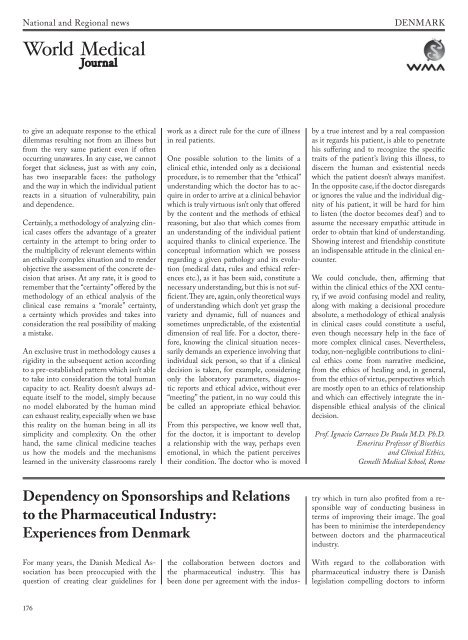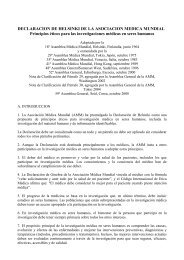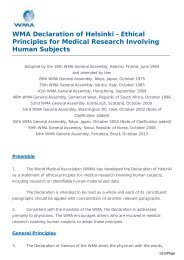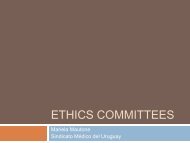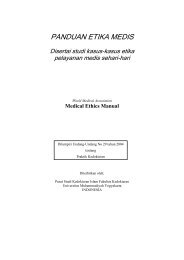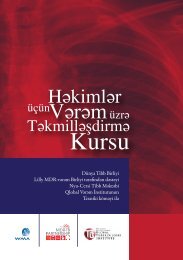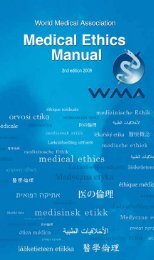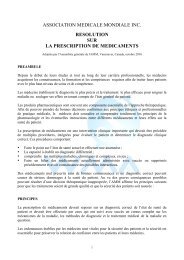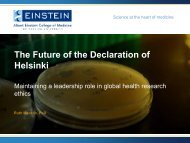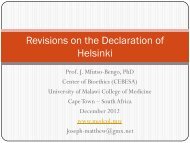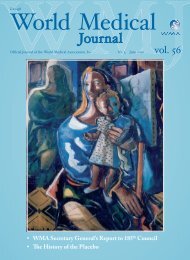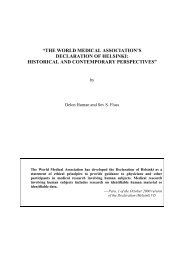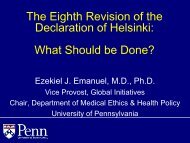WMJ 05 2011 - World Medical Association
WMJ 05 2011 - World Medical Association
WMJ 05 2011 - World Medical Association
Create successful ePaper yourself
Turn your PDF publications into a flip-book with our unique Google optimized e-Paper software.
National and Regional news<br />
DENMARK<br />
to give an adequate response to the ethical<br />
dilemmas resulting not from an illness but<br />
from the very same patient even if often<br />
occurring unawares. In any case, we cannot<br />
forget that sickness, just as with any coin,<br />
has two inseparable faces: the pathology<br />
and the way in which the individual patient<br />
reacts in a situation of vulnerability, pain<br />
and dependence.<br />
Certainly, a methodology of analyzing clinical<br />
cases offers the advantage of a greater<br />
certainty in the attempt to bring order to<br />
the multiplicity of relevant elements within<br />
an ethically complex situation and to render<br />
objective the assessment of the concrete decision<br />
that arises. At any rate, it is good to<br />
remember that the “certainty” offered by the<br />
methodology of an ethical analysis of the<br />
clinical case remains a “morale” certainty,<br />
a certainty which provides and takes into<br />
consideration the real possibility of making<br />
a mistake.<br />
An exclusive trust in methodology causes a<br />
rigidity in the subsequent action according<br />
to a pre-established pattern which isn’t able<br />
to take into consideration the total human<br />
capacity to act. Reality doesn’t always adequate<br />
itself to the model, simply because<br />
no model elaborated by the human mind<br />
can exhaust reality, especially when we base<br />
this reality on the human being in all its<br />
simplicity and complexity. On the other<br />
hand, the same clinical medicine teaches<br />
us how the models and the mechanisms<br />
learned in the university classrooms rarely<br />
work as a direct rule for the cure of illness<br />
in real patients.<br />
One possible solution to the limits of a<br />
clinical ethic, intended only as a decisional<br />
procedure, is to remember that the “ethical”<br />
understanding which the doctor has to acquire<br />
in order to arrive at a clinical behavior<br />
which is truly virtuous isn’t only that offered<br />
by the content and the methods of ethical<br />
reasoning, but also that which comes from<br />
an understanding of the individual patient<br />
acquired thanks to clinical experience. The<br />
conceptual information which we possess<br />
regarding a given pathology and its evolution<br />
(medical data, rules and ethical references<br />
etc.), as it has been said, constitute a<br />
necessary understanding, but this is not sufficient.<br />
They are, again, only theoretical ways<br />
of understanding which don’t yet grasp the<br />
variety and dynamic, full of nuances and<br />
sometimes unpredictable, of the existential<br />
dimension of real life. For a doctor, therefore,<br />
knowing the clinical situation necessarily<br />
demands an experience involving that<br />
individual sick person, so that if a clinical<br />
decision is taken, for example, considering<br />
only the laboratory parameters, diagnostic<br />
reports and ethical advice, without ever<br />
“meeting” the patient, in no way could this<br />
be called an appropriate ethical behavior.<br />
From this perspective, we know well that,<br />
for the doctor, it is important to develop<br />
a relationship with the way, perhaps even<br />
emotional, in which the patient perceives<br />
their condition. The doctor who is moved<br />
by a true interest and by a real compassion<br />
as it regards his patient, is able to penetrate<br />
his suffering and to recognize the specific<br />
traits of the patient’s living this illness, to<br />
discern the human and existential needs<br />
which the patient doesn’t always manifest.<br />
In the opposite case, if the doctor disregards<br />
or ignores the value and the individual dignity<br />
of his patient, it will be hard for him<br />
to listen (the doctor becomes deaf ) and to<br />
assume the necessary empathic attitude in<br />
order to obtain that kind of understanding.<br />
Showing interest and friendship constitute<br />
an indispensable attitude in the clinical encounter.<br />
We could conclude, then, affirming that<br />
within the clinical ethics of the XXI century,<br />
if we avoid confusing model and reality,<br />
along with making a decisional procedure<br />
absolute, a methodology of ethical analysis<br />
in clinical cases could constitute a useful,<br />
even though necessary help in the face of<br />
more complex clinical cases. Nevertheless,<br />
today, non-negligible contributions to clinical<br />
ethics come from narrative medicine,<br />
from the ethics of healing and, in general,<br />
from the ethics of virtue, perspectives which<br />
are mostly open to an ethics of relationship<br />
and which can effectively integrate the indispensible<br />
ethical analysis of the clinical<br />
decision.<br />
Prof. Ignacio Carrasco De Paula M.D. Ph.D.<br />
Emeritus Professor of Bioethics<br />
and Clinical Ethics,<br />
Gemelli <strong>Medical</strong> School, Rome<br />
Dependency on Sponsorships and Relations<br />
to the Pharmaceutical Industry:<br />
Experiences from Denmark<br />
the collaboration between doctors and<br />
the pharmaceutical industry. This has<br />
been done per agreement with the industry<br />
which in turn also profited from a responsible<br />
way of conducting business in<br />
terms of improving their image. The goal<br />
has been to minimise the interdependency<br />
between doctors and the pharmaceutical<br />
industry.<br />
For many years, the Danish <strong>Medical</strong> <strong>Association</strong><br />
has been preoccupied with the<br />
question of creating clear guidelines for<br />
With regard to the collaboration with<br />
pharmaceutical industry there is Danish<br />
legislation compelling doctors to inform<br />
176


